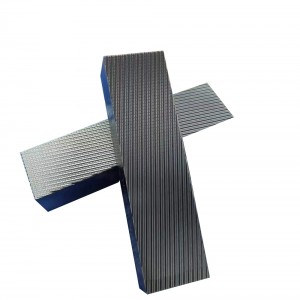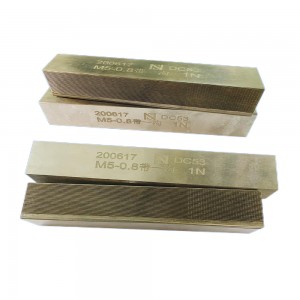Carbide Tap And Thread Die Set
The best materials for thread rolling dies should possess several key properties to ensure optimal performance and longevity. One of the most important factors to consider is the hardness of the material. Thread rolling dies are subject to high pressure and friction during the rolling process, so the material must be able to withstand these forces without rapidly deforming or wearing out. Typically, high hardness materials such as tool steel are preferred for manufacturing thread rolling dies.
Tool steels, including D2, A2, and M2, are commonly used in manufacturing thread rolling dies due to their excellent hardness and wear resistance. These steels maintain their shape and sharpness even under the high stress and heat generated during rolling
| Item | Parameter |
| Place of Origin | Guangdong,China |
| Brand Name | Nisun |
| Material | DC53, SKH-9 |
| Tolerance: | 0.001mm |
| Hardness: | Generally HRC 62-66, depends on material |
| Used for | tapping screws,Machine Screws,Wood Screws,Hi-Lo Screws,Concrete Screws,Drywall Screws and so on |
| Finish: | Highly mirror polished finish 6-8 micro. |
| Packing | PP+Small Box and Carton |
The regular maintenance of mold parts has a great influence on the life of the mold.
The question is: How do we maintain when using these components?
Step 1.Make sure there is a vacuum machine that automatically removes the waste at regular intervals. If the waste is removed well, the breakage rate of the punch will be lower.
Step 2.Make sure the density of the oil is correct,not too sticky or diluted.
Step 3. If there is a wear problem on the die and die edge, stop using it and polish it in time, otherwise it will wear out and quickly expand the die edge and reduce the life of the die and parts.
Step 4. To ensure the life of the mold, the spring should also be replaced regularly to prevent the spring from being damaged and affecting the use of the mold.
1.Drawings Confirmation----We get drawings or samples from customer.
2.Quotation----We will quote according to customer's drawings.
3.Making Molds/Patterns----We will make molds or patterns upon customer's mold orders.
4.Making Samples---We will use the mold to make the actual sample, and then send it to the customer for confirmation.
5.Mass Production----We will make bulk production after getting the customer's confirmation and order.
6.Production inspection----We will inspect the products by our inspectors, or let customers inspect them with us after completion.
7.Shipment---- We will ship the goods to the customer after the inspection result is OK and confirmed by customer.














